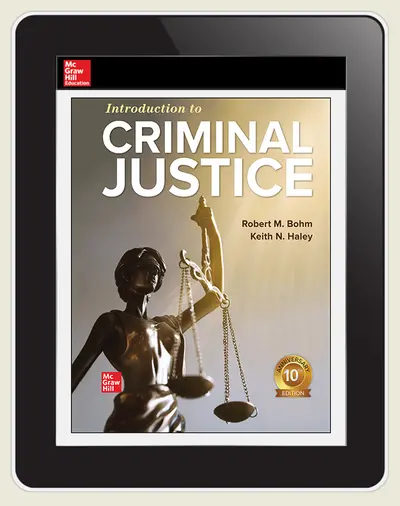Robert M. Bohm is Professor Emeritus of Criminal Justice at the University of Central Florida. He also has been a faculty member in the Department of Criminal Justice at the University of North Carolina at Charlotte (1989–1995) and at Jacksonville State University in Alabama (1979–1989). In 1973 and 1974, he worked for the Jackson County Department of Corrections in Kansas City, Missouri, first as a corrections officer and later as an instructor/counselor in the Model Inmate Employment Program, a Law Enforcement Assistance Administration sponsored–work-release project. He received his PhD in criminology from Florida State University in 1980. He has published numerous journal articles, book chapters, and books, in the areas of criminal justice and criminology. In addition to being the co-author of Introduction to Criminal Justice, 9th ed. (McGraw Hill), he is the author of A Concise Introduction to Criminal Justice (McGraw Hill, 2008); Deathquest: An Introduction to the Theory and Practice of Capital Punishment in the United States, 5th ed.; Ultimate Sanction: Understanding the Death Penalty Through Its Many Voices and Many Sides; The Past as Prologue: The Supreme Court’s Pre-Modern Death Penalty Jurisprudence and Its Influence on the Supreme Court’s Modern Death Penalty Decisions; Capital Punishment’s Collateral Damage; and A Primer on Crime and Delinquency Theory, 4th ed. (with Brenda L. Vogel). He is also editor of The Death Penalty in America: Current Research and The Death Penalty Today, and co-editor (with James R. Acker and Charles S. Lanier) of America’s Experiment with Capital Punishment: Reflections on the Past, Present, and Future of the Ultimate Sanction, 3rd ed., Demystifying Crime and Criminal Justice, 2nd ed. (with Jeffery T. Walker), and the Routledge Handbook of Capital Punishment (with Gavin M. Lee). Bohm served as president of the Academy of Criminal Justice Sciences in 1992–1993. In 1989, the Southern Criminal Justice Association named him Outstanding Educator of the Year. In 1999, he was elected a Fellow of the Academy of Criminal Justice Sciences. In 2001, he was presented with the Academy’s Founder’s Award, and in 2008, he received the Academy’s Bruce Smith Sr. Award.
Keith N. Haley was Professor Emeritus of Criminal Justice in the School of Criminal Justice and Social Sciences at Tiffin University. He was also Chair of Criminal Justice and Social Science Graduate Programs, Dean of the School of Criminal Justice, Chair of the Criminal Justice Department, Dean and Associate Vice President of the School of Off-Campus Learning, Associate Vice President for Special Projects, and acted as the primary contact for the Tiffin University MBA program in Bucharest, Romania. He also served as coordinator of the Criminal Justice Programs at Collin County Community College in Texas, Director of the Criminal Justice Program at Redlands Community College in Oklahoma, Chair of the Criminal Justice Department at the University of Cincinnati, Executive Director of the Ohio Peace Officer Training Commission, and police officer in Dayton, Ohio. Haley received a Bachelor of Science degree in education from Wright State University and a Master of Science degree in criminal justice from Michigan State University. Haley was the author, co-author, and editor of 30 books (including revised editions), several book chapters, and many articles in criminal justice publications. He served as a consultant to many public service, university, business, and industrial organizations on management, online learning, criminal justice research, and memory skills. The American Association of University Administrators presented the 2001 Nikolai N. Khaladjan International Award for Innovation in Higher Education to Haley for his leadership in the Tiffin University/University of Bucharest "Partnership for Justice" project, which established a graduate school of criminal justice administration at the University of Bucharest. Bohm and Haley’s Introduction to Criminal Justice was translated into the Romanian language under the title of Justitia Penala, and has been used in the University of Bucharest graduate program for criminal justice leaders.
















































Social Studies
View all Social Studies Programs
IMPACT (K–5)
Actively Learn (3–12)
New Social Studies (6–12)
Networks (6–12)